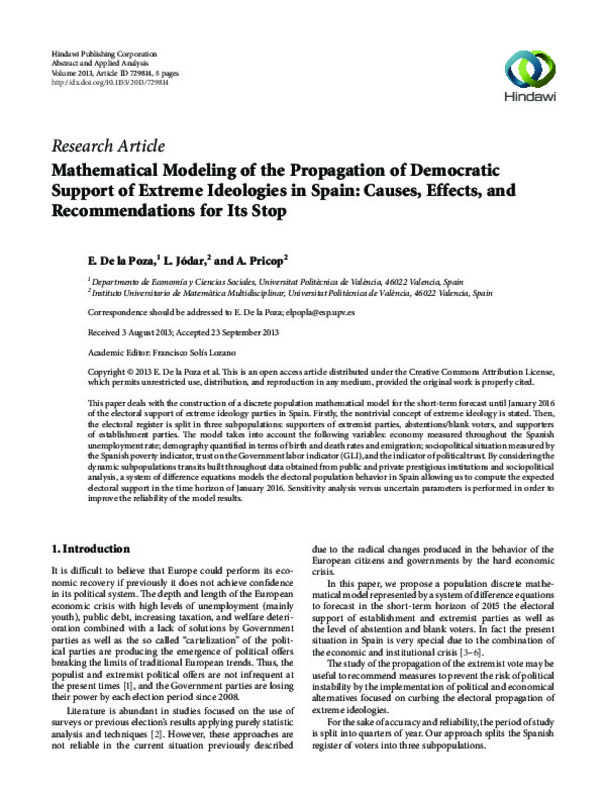JavaScript is disabled for your browser. Some features of this site may not work without it.
Buscar en RiuNet
Listar
Mi cuenta
Estadísticas
Ayuda RiuNet
Admin. UPV
Mathematical modeling of the propagation of democratic support of extreme ideologies in Spain:Causes, Effects and Recommendations for its stop
Mostrar el registro sencillo del ítem
Ficheros en el ítem
| dc.contributor.author | De la Poza, Elena
|
es_ES |
| dc.contributor.author | Jódar Sánchez, Lucas Antonio
|
es_ES |
| dc.contributor.author | Pricop, Adriana Georgiana
|
es_ES |
| dc.date.accessioned | 2014-03-21T10:55:24Z | |
| dc.date.available | 2014-03-21T10:55:24Z | |
| dc.date.issued | 2013 | |
| dc.identifier.issn | 1085-3375 | |
| dc.identifier.uri | http://hdl.handle.net/10251/36559 | |
| dc.description.abstract | This paper deals with the construction of a discrete population mathematical model for the short-term forecast until January 2016 of the electoral support of extreme ideology parties in Spain. Firstly, the nontrivial concept of extreme ideology is stated. Then, the electoral register is split in three subpopulations: supporters of extremist parties, abstentions/blank voters, and supporters of establishment parties. The model takes into account the following variables: economy measured throughout the Spanish unemployment rate; demography quantified in terms of birth and death rates and emigration; sociopolitical situation measured by the Spanish poverty indicator, trust on the Government labor indicator (GLI), and the indicator of political trust. By considering the dynamic subpopulations transits built throughout data obtained from public and private prestigious institutions and sociopolitical analysis, a system of difference equations models the electoral population behavior in Spain allowing us to compute the expected electoral support in the time horizon of January 2016. Sensitivity analysis versus uncertain parameters is performed in order to improve the reliability of the model results. | es_ES |
| dc.description.sponsorship | The authors of this paper would like to thank Phd. Pauwels from Universite Libre de Bruxelles and also Professor Eva Anduiza and her coworkers from Universidad Autonoma de Barcelona (UAB) for their valuable comments that have enriched our research. The authors would also thank the Universitat Poliecnica de Valencia since this paper has been financed through the Grant PAID06-11-2070. | en_EN |
| dc.language | Inglés | es_ES |
| dc.publisher | Hindawi Publishing Corporation | es_ES |
| dc.relation.ispartof | Abstract and Applied Analysis | es_ES |
| dc.rights | Reconocimiento (by) | es_ES |
| dc.subject.classification | ECONOMIA FINANCIERA Y CONTABILIDAD | es_ES |
| dc.subject.classification | MATEMATICA APLICADA | es_ES |
| dc.title | Mathematical modeling of the propagation of democratic support of extreme ideologies in Spain:Causes, Effects and Recommendations for its stop | es_ES |
| dc.type | Artículo | es_ES |
| dc.identifier.doi | 10.1155/2013/729814 | es_ES |
| dc.relation.projectID | info:eu-repo/grantAgreement/UPV//PAID-06-11-2070/ | es_ES |
| dc.rights.accessRights | Abierto | es_ES |
| dc.contributor.affiliation | Universitat Politècnica de València. Departamento de Matemática Aplicada - Departament de Matemàtica Aplicada | es_ES |
| dc.contributor.affiliation | Universitat Politècnica de València. Departamento de Economía y Ciencias Sociales - Departament d'Economia i Ciències Socials | es_ES |
| dc.description.bibliographicCitation | De La Poza, E.; Jódar Sánchez, LA.; Pricop, AG. (2013). Mathematical modeling of the propagation of democratic support of extreme ideologies in Spain:Causes, Effects and Recommendations for its stop. Abstract and Applied Analysis. 2013(1):1-8. https://doi.org/10.1155/2013/729814 | es_ES |
| dc.description.accrualMethod | S | es_ES |
| dc.relation.publisherversion | http://dx.doi.org/10.1155/2013/729814 | es_ES |
| dc.description.upvformatpinicio | 1 | es_ES |
| dc.description.upvformatpfin | 8 | es_ES |
| dc.type.version | info:eu-repo/semantics/publishedVersion | es_ES |
| dc.description.volume | 2013 | es_ES |
| dc.description.issue | 1 | es_ES |
| dc.relation.senia | 255834 | |
| dc.contributor.funder | Universitat Politècnica de València | es_ES |
| dc.description.references | Evans, J., & Ivaldi, G. (2010). Comparing forecast models of Radical Right voting in four European countries (1973–2008). International Journal of Forecasting, 26(1), 82-97. doi:10.1016/j.ijforecast.2009.04.001 | es_ES |
| dc.description.references | Raafat, R. M., Chater, N., & Frith, C. (2009). Herding in humans. Trends in Cognitive Sciences, 13(10), 420-428. doi:10.1016/j.tics.2009.08.002 | es_ES |
| dc.description.references | De la Poza, E., Guadalajara, N., Jódar, L., & Merello, P. (2013). Modeling Spanish anxiolytic consumption: Economic, demographic and behavioral influences. Mathematical and Computer Modelling, 57(7-8), 1619-1624. doi:10.1016/j.mcm.2011.10.020 | es_ES |
| dc.description.references | De la Poza, E., del Líbano, M., García, I., Jódar, L., & Merello, P. (2013). Predicting workaholism in Spain: a discrete mathematical model. International Journal of Computer Mathematics, 91(2), 233-240. doi:10.1080/00207160.2013.783205 | es_ES |
| dc.description.references | García, I., Jódar, L., Merello, P., & Santonja, F.-J. (2011). A discrete mathematical model for addictive buying: Predicting the affected population evolution. Mathematical and Computer Modelling, 54(7-8), 1634-1637. doi:10.1016/j.mcm.2010.12.012 | es_ES |








